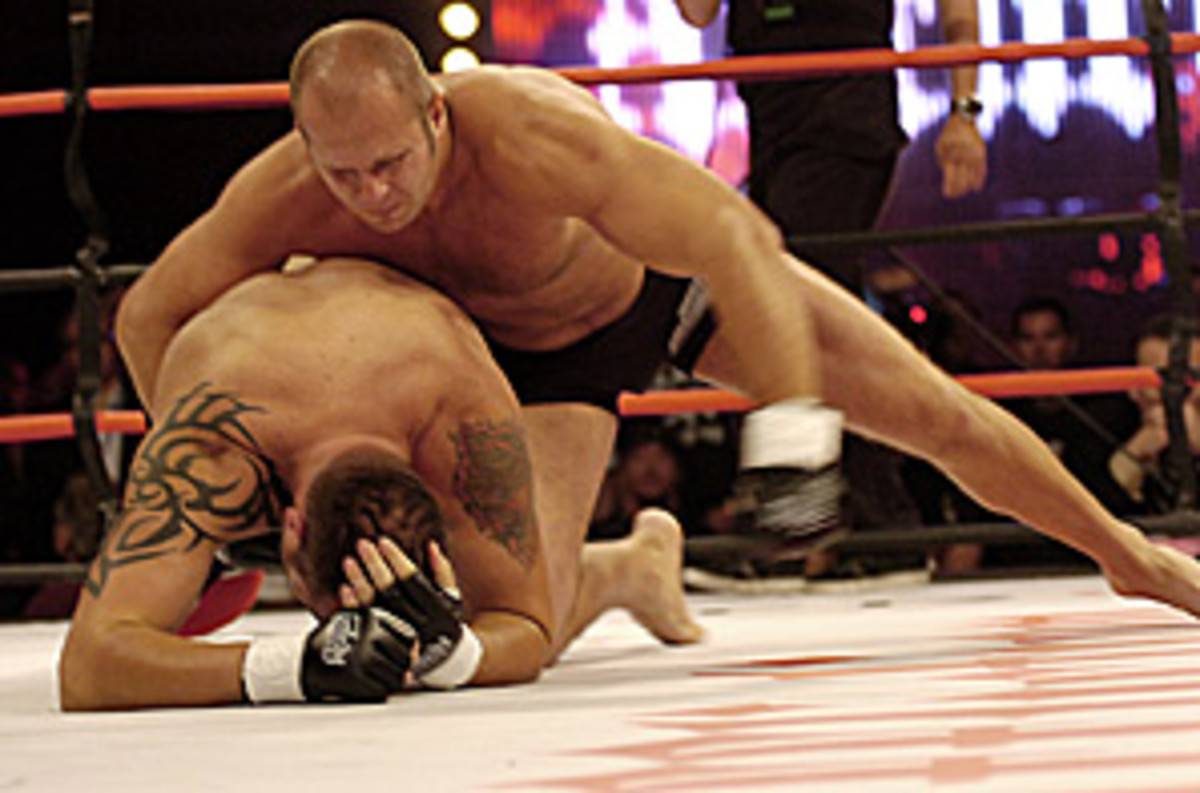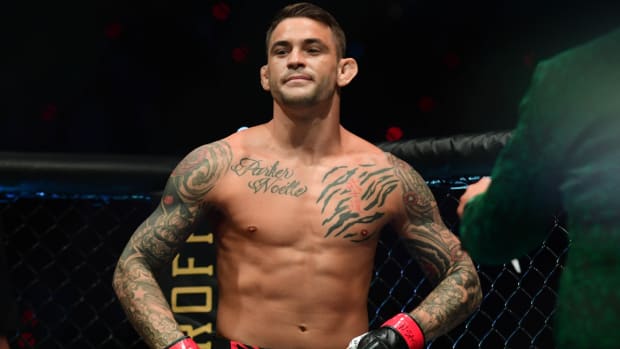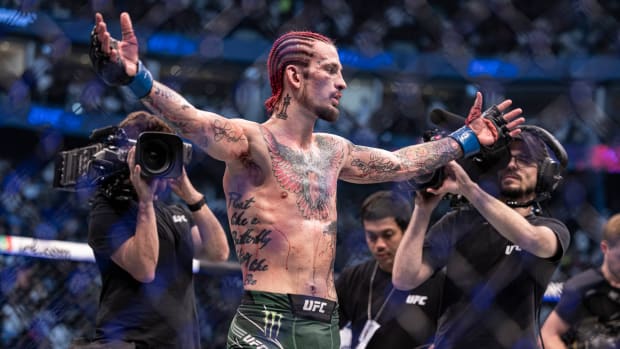MMA (or is it UFC?) continues to defy odds with yearly growth
Wall Street is a mess. Main Street is even messier. The U.S. jobless rate has hit a 14-year high, the country is swimming in a $455 billion federal deficit, and even the Warren Buffet-led Berkshire Hathaway and the ultra-lux Hamptons are feeling the heat.
In sports, the cater-to-the-wealthy PGA Tour is struggling as its top advertisers die off. FIFA, the governing body for international soccer, the most expansive sport in the world, has warned that levels in debt have become unsustainable (Manchester United is swimming in US$1.3-plus billion of debt.) College and high school athletic departments are making cuts to even their top sports, the NBA has made major staff cuts and has eliminated the middlemen for much of its marketing ventures.
NASCAR is losing fans as the economy struggles and Bud Selig has warned the ever-prosperous Major League Baseball teams to take it easy on ticket prices this year.
And while everyone fears the dreaded D-word, or R-word, some have already nicknamed our recent past "The 2008 Crash."
However, mixed martial arts, a sport still unaccepted and unheard of by many, continues to grow. While it may not be booming like it was in recent years, the fringe sport still holding the title of "human cockfighting" (thank you, John McCain) is still enjoying a steady climb -- in both the U.S. and abroad.
All from a sport that still isn't sanctioned in all 50 states.
"People want to be entertained, regardless," said Couture, who has held UFC titles in two weight classes and, in this past year alone, has starred in two movies, a video game, penned a New York Times bestseller and signed a three-fight deal to return to the Octagon. "It's like the movie industry: people want to still see movies, they want to check out and kind of get away from reality for an hour or two. Mixed martial arts is a combative sport that is a form of entertainment that people get into and, no matter the economy, people are still going to tune in."
On Nov. 10, the UFC released an economic impact report to support its push for sanctioning in New York. The study, conducted by HR&A Advisors, projected that a UFC event in New York City would generate $11.5 million in "new economic activity" from event spending, tourist lodging and tax revenue dollars.
"In the last 15 years, it has grown into an international phenomenon," said New York State Senator Joseph A. Griffo, a supporter of MMA sanctioning in the state. "It's long past time to look into officially sanctioning this sport in New York. More than two-thirds of the states commission mixed martial arts matches. There are significant tourist and tax revenue dollars flowing to neighboring states who are hosting these events. We need to immediately examine the potential for the sport to thrive here."
According to the Sports Business Journal, gate receipts for pay-per-view UFC events have averaged $3.25 million -- an increase of nearly half a million from last year -- and Zuffa LLC, the parent company of both the UFC and World Extreme Cagefighting, is reining in $300 million in annual revenue.
But the numbers that are often overlooked but nonetheless striking, are live ticket sales. With three more shows set before year's end, the UFC will have hosted 20 events this year. With ticket prices for a live UFC event in 2007 averaging $250, and thousands selling per event ... well, you do the math.
The promotion's first event (which is also it's first event in Dublin, Ireland) of the new year, UFC 93: Franklin vs. Henderson, sold out in its first two weeks. The UFC now holds sell-out records in six of the biggest arenas in all of Europe.
Forbes magazine dubbed the UFC the "Ultimate Money Machine," as the organization hauled $25 million from an event held in Las Vegas just three weeks before the Super Bowl. The breakdown: 10,700 fans who paid an average of $340 a pop to see the show live, plus another 500,000 viewers sitting on their couches who dished out $45 apiece ($55 for high definition).
Nine fights, $25 million. Bargain.
"There is a compelling argument that MMA has already eclipsed boxing and will likely do the same to hockey by mid-2009," said Joseph Noel, a principal analyst for Emerging Growth Research, which issued a report claiming MMA passing the NBA in interest among suburban youth. "We strongly believe the mixed martial arts industry will continue to see strong growth over the coming years."
MMA has enjoyed enough "strong growth" to call itself "the fastest growing sport in America" and appear credible in doing so. But its success has come with a twist: MMA may be turning into simply the UFC.
White, with casino magnates Frank and Lorenzo Fertitta, dropped $2 million to revamp the "cash-bleeding" UFC in 2001 -- a move that appeared brash even to Forbes. Now, Zuffa is worth more than $1 billion. How?
Well, aside from their lucrative pay-per-view showings, live events and sponsorship and licensing agreements, it's limited its fighters' salaries. While rivaling boxing for mainstream attention and revenue, the UFC's payouts pale in comparison to those of boxers. Big-namers like Chuck Liddell and Quinton "Rampage" Jackson have earned millions -- primarily from endorsements -- but most UFC fighters are paid mere thousands -- bonuses included -- for fights. Boxers earn multiple millions, as well as a share of the pay-per-view proceeds. (Floyd Mayweather Jr. earned a reported $50 million in 2007. He only fought twice that year.)
Smaller promotions have fallen almost as fast as they have risen, making the Zuffa organization the main player in the game. Along with EliteXC's recent demise, the International Fight League drowned in debt in September, just two years after the company went public.
Correlating the struggles of upstart promotions to the current economic state is all too easy. And it may be entirely out of line.
"I think it's mismanagement, absolutely," said Affliction Vice President TomAtencio. "With EliteXC, it's a lot of people that don't really know the industry and come from other industries and try to run it in ways that don't work. They don't have a full knowledge of the sport and the industry, and this is hearsay, but I think it's just a mismanagement of finances. Nothing more than that."
Now, it seems the top contenders to rival the kingpin UFC are Affliction and Strikeforce. Affliction is scheduled to put on its second event Jan. 24, though it, too, has been rumored to be struggling. Strikeforce, under the leadership of Scott Coker, quietly continues to pick up steam via its partnership with NBC and successful events at the Playboy Mansion. (Plus, it's the only promotion Dana White hasn't verbally bashed.)
Major money men and sports enthusiasts, from Trump to the president of Coach handbags, Reed Krakoff, have put their name and dollars into MMA. But as the money keeps flowing and the odds against the sport's success pile on, the question may always be raised and never fully answered: How? How is this sport still thriving?
"The sport is absolutely still growing -- I think the network television shows have definitely helped it, and the exposure from companies like Strikeforce, obviously the UFC, us, EliteXC have helped," Atencio said. "The sport has jumped leaps and bounds, but with the economy, it's going to take a little bit more work. I think it's slowly building new fans, but there are still a lot of people that don't understand it completely. But 2007, 2008, they were great years."





